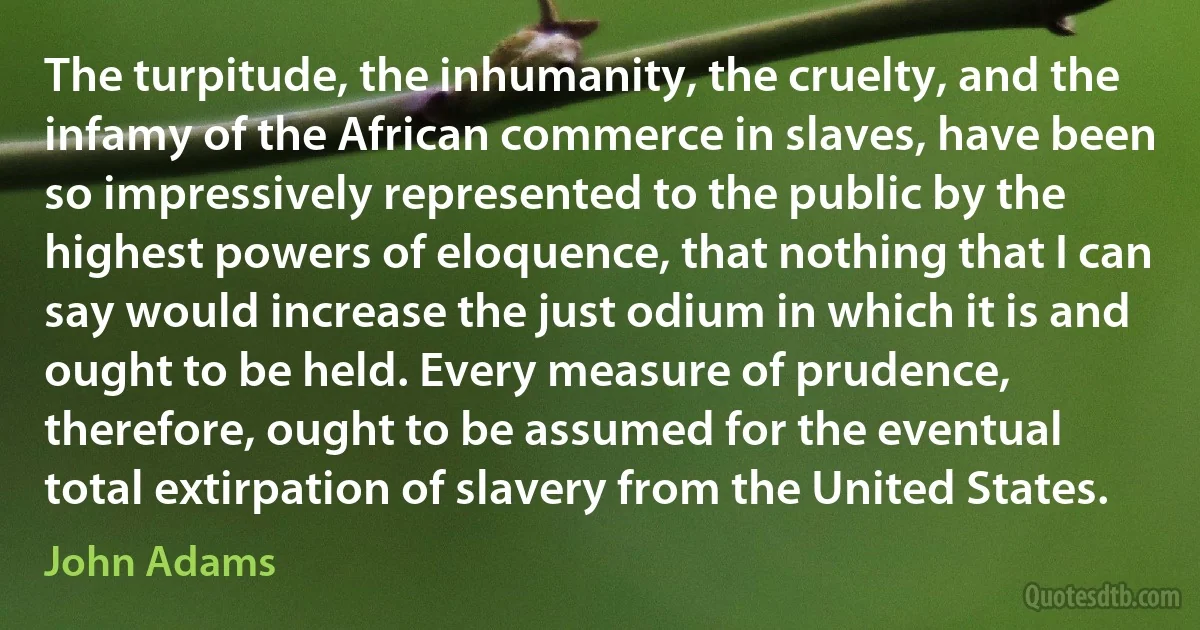Extirpation Quotes
Not only boxing, but wrestling, quarter-staff, single-stick, bull-baiting, every exercise of the common people, that supposes the possible risk of life or limb, and, of course, that tends to prepare them for deeds of bravery of a higher order, and, by the means of those deeds and of the character and consequence naturally growing out of them, to preserve the independence and the liberties of their country; every such exercise seems to be doomed to extirpation. ... Every thing calculated to keep alive the admiration, and even the idea, of hardihood, seems to have become offensive and odious in the sight of but too many of those, whose duty it is to endeavour to arrest, and not to accelerate, the fatal progress of effeminacy. ... That cuttings and stabbings are more fatal than boxing, to say nothing of the disgrace, every one must agree; and, it cannot be denied, that the former have increased in proportion as the latter has been driven from amongst the people.

William Cobbett
There is no country in Europe which does not have in some corner or other one or several ruined fragments of peoples (Völkerruinen), the remnant of a former population that was suppressed and held in bondage by the nation which later became the main vehicle of historical development. These relics of a nation mercilessly trampled under foot in the course of history, as Hegel says, these residual fragments of peoples (Völkerabfälle) always become fanatical standard-bearers of counter-revolution and remain so until their complete extirpation or loss of their national character, just as their whole existence in general is itself a protest against a great historical revolution.

Friedrich Engels
However, mass expulsion and even genocide began to make their appearance on the southern margins of Europe during and after World War I, as the Turks set about the mass extirpation of the Armenians in 1915 and, after the Greco Turkish war of 1911, expelled between 1.3 and 1.5 millions of Greeks from Asia Minor, where they had lived since the days of Homer.1 Subsequently Adolph Hitler, who was in this respect a logical Wilsonian nationalist, arranged to transfer Germans not living on the territory of the fatherland, such as those of Italian South Tyrol, to Germany itself, as he also arranged for the permanent elimination of the Jews.

Eric Hobsbawm
It is a melancholy reflection that our modes of population have been more destructive to the Indian natives than the conduct of the conquerors of Mexico and Peru. The evidence of this is the utter extirpation of nearly all the Indians in the most populous parts of the Union. A future historian may mark the causes of this destruction of the human race in sable colors. Although the present Government of the United States cannot with propriety be involved in the oppropbrium, yet it seems necessary however, in order to render their attention upon this subject strongly characteristic of their justice, that some powerful attempts should be made to tranquilize the frontiers, particularly those south of the Ohio.

Henry Knox
I personally believed, at least in 1914 when predator control began, that there could not be too much horned game, and that the extirpation of predators was a reasonable price to pay for better big game hunting. Some of us have learned since the tragic error of such a view, and acknowledged our mistake. One must judge from the present volume that the Fish and Wildlife Service does not see any mistake.

Aldo Leopold
we should facilitate, instead of foolishly and vainly endeavouring to impede, the operations of nature in producing this mortality; and if we dread the too frequent visitation of the horrid form of famine, we should sedulously encourage the other forms of destruction, which we compel nature to use. Instead of recommending cleanliness to the poor, we should encourage contrary habits. In our towns we should make the streets narrower, crowd more people into the houses, and court the return of the plague. In the country, we should build our villages near stagnant pools, and particularly encourage settlements in all marshy and unwholesome situations.*12 But above all, we should reprobate specific remedies for ravaging diseases; and those benevolent, but much mistaken men, who have thought they were doing a service to mankind by projecting schemes for the total extirpation of particular disorders. http://www.econlib.org/library/Malthus/malPlong30.html#dd12 Book IV, Chapter V.

Thomas Malthus
The god of Moses would call for other tribes, including his favorite one, to suffer massacre and plague and even extirpation, but when the grave closed over his victims he was essentially finished with them unless he remembered to curse their succeeding progeny. Not until the advent of the Prince of Peace do we hear of the ghastly idea of further punishing and torturing the dead.

Jesus Christ


